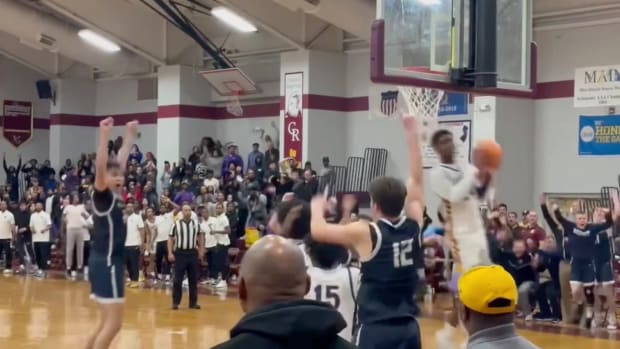
Recruiting dos and don'ts
Whether you're a blue-chip prospect or someone who is fighting for a scholarship, this is a crucial time in the recruiting process. Coaches are out on the road making home and high school visits and recruits take official visits to college campuses on the weekends. During this time, it's equally important for prospects to make a good impression on coaches as it is for coaches to impress players.
It is important that recruits and their parents know what to do and what not to do during this critical juncture. Here's a quick guide to help you through the process.
• Do care about your physical appearance.If a coach is in your home that means your game film was impressive enough that they are seriously interested in you. But how you perform on the field is just one part of the equation. Another critical facet of their evaluation of you revolves around your physique. They call it the "eyeball test" and several college coaches have told me that it is even more important than the game film itself. Coaches want to see if you "look the part" of a player who can play football at a high level in their conference.
I hurt my shoulder my senior year of high school during football season and was unable to really lift weights during basketball season. This caused me to lose weight and muscle mass. To make matters worse, I was sick and home from school when I was visited by a coach from Villanova University. Less than a week after that coach visited me, he called to tell me that they would not be offering me a scholarship because my body had not progressed like they hoped it would. I had failed the "eyeball test".
It might sound quirky, but I recommend wearing whatever clothes you have that make you look the most impressive physically. Whether it is a couple of extra T-shirts or those boots with the big heel, you only get one opportunity to make a first impression.
• Don't believe everything the coaches tell you.Coaches will do whatever it takes to convince you to come to their school if they have identified you as a prospect they want. There are often a lot of false promises made regarding playing time and position switches. Coaches will also often tell you that you are the only player they are recruiting at your position. Take everything they say with a grain of salt and remember they are trying to sell you on the fact that coming to their school would be the best decision of your life.
• Do be respectful and express your unending love for the game.The third part of the evaluation process for coaches is finding out what type of person you are. They don't want to recruit players with bad attitudes who are disrespectful. They also want to make sure football is really important to you. A coach will look in your eyes and attempt to see if you're genuine and have a burning desire to play the game at the next level. Show them.
• Don't be afraid to ask questions.This is your time to find out anything and everything you can about all of the schools you are considering. You should not hesitate to ask questions about facilities, social life, academic programs, alumni support, and more. It is critically important that you find out everything about the school, coach, and football program before you commit to attend that university.
• Do take all five of your visits.Official visits are all-expense paid trips in which you get to explore everything the university and its football program have to offer. Division I schools typically only host between 35 and 65 recruits for these official visits, so they are usually very judicious who they offer them to. You are only allowed to take five official visits. Take them all so you can make the best and most informed decision possible.
• Do not be arrogant.Nothing can turn off your future coach or teammates more than a recruit who is full of himself. No matter how good you think you are or how much you enjoy the praise being showered upon you during the recruiting process, you will still be just another freshman come August. Almost every player at that school was in the same situation when they were a high school recruit and will not be overly impressed with your high school resume, no matter how stellar it may be.
College coaches do not want to mess with team chemistry and will usually take the time to ask your host and other guys already on the team what they thought of you as a person. That is often the last thing they are looking for when completing their evaluation of you: how will you fit in? If you come off as standoffish or conceited and rub the players the wrong way, they could decide to either not offer you or pull the offer on the table. Remember, personality counts and you are constantly being evaluated.
• Do make the most of the opportunity.This is your one chance to spend an extended period of time at a university you are considering. In addition to building a rapport with the players on the team, make sure you see what else the campus has to offer and take time to meet people outside of the football program. That includes professors, deans, counselors and students. Consider the school as a whole, not just the football program.
• Don't be pressured into giving a verbal commitment.One of the many techniques used by college coaches during the official visit is the hard sell on the last day before you go home. Remember, if coaches truly want you to be a part of their program, they will give you a reasonable amount of time to make your decision. Any school that wants an answer immediately is probably not the right school for you.
Official visits are typically the culmination of the recruiting process. By this time you should have a good feel for the campus life and the academic offerings in addition to your potential role with the football team. You also should have a good sense of what you like and don't like about each school. If you have a strong gut feeling as to what school you want to attend, odds are that is the place for you. If you have trouble sorting everything out and making sense of it all, take the time to make up a list of pros and cons for every school you are considering.




